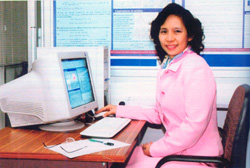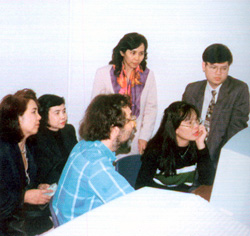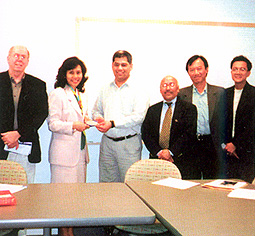|
The
Achievements of Professor Dr. Yongwimon
Lenbury
 Professor
Dr. Yongwimon Lenbury was born
in Bangkok on August 23, 1952. Following
primary and secondary education in
Thailand, she went abroad to study
under the Columbo Plan Scholarship
and received a B.Sc. and an M.Sc.
in Applied Mathematics from the Australian
National University. She later received
a Ph.D. in Mathematics from Vanderbilt
University in the United States of
America and returned to the Department
of Mathematics, Faculty of Science,
Mahidol University to teach, conduct
research in dynamical modeling of
nonlinear systems in biology and medicine,
and guide students at both the undergraduate
and graduate levels. She was appointed
professor of mathematics in 1996. Professor
Dr. Yongwimon Lenbury was born
in Bangkok on August 23, 1952. Following
primary and secondary education in
Thailand, she went abroad to study
under the Columbo Plan Scholarship
and received a B.Sc. and an M.Sc.
in Applied Mathematics from the Australian
National University. She later received
a Ph.D. in Mathematics from Vanderbilt
University in the United States of
America and returned to the Department
of Mathematics, Faculty of Science,
Mahidol University to teach, conduct
research in dynamical modeling of
nonlinear systems in biology and medicine,
and guide students at both the undergraduate
and graduate levels. She was appointed
professor of mathematics in 1996.
From her research contributions,
she was meritoriously given the Outstanding
Researcher Award in the field of Physical
Science and Mathematics from the National
Research Council in 1998.
Professor Lenbury's research interest
is in the construction and analysis
of mathematical models of systems
in biology and medical science, using
theory of nonlinear and dynamical
systems. Her research has yielded
over 60 international journal publications,
and may be grouped into 3 areas of
interest.
The first area is concerned
with dynamical modeling of nonlinear
systems in biotechnology. Consideration was given to the effects
of different important external factors
on the effcient operation of continuous
bioreactors, such as the effect of
products of a fermentation system
on the rates of change of cells and
limiting substrate, or the effect
of membrane permeability on the transfer
of nutrient across the cell membrane,
due to geometric field variation,
for example. The results of such research
work on dynamical modeling can be
extremely useful for the optimal control
and management of such systems of
crucial importance in the pharmaceutical
and food industries.
The second area involves
the dynamical modeling of nonlinear
systems in the field of medical science. Professor Lenbury and her research
team have been interested in modeling
the cortisol secretion as well as
testosterone secretion cascade systems
in the human body, modeling the control
of plasma glucose by insulin secreted
by the pancreatic ß-cells, and
modeling the roles of estrogen and
parathyroid hormones on bone resorption,
for example.
 Lately,
Professor Lenbury has produced research
results on the analysis of models
for signal transduction processes
among living cells, which has important
implications on the study of how different
processes in the human body function
or disfunction. Professor Lenbury
and her team collaborate actively
with medical experts such as a heart
surgeon who routinely carries out
coronary bypass operations on patients
with atherosclerosis. She would like
to advice on how the operation should
be carried out for optimal and long
lasting result. This needs mathematical
modeling and numerical computation
to simulate blood flow in stenosed
blood vessels using real geometry.
Moreover, Professor Lenbury and her
team have studied models of several
epidemics which create serious control
problems, such as HIV, malaria, parasitic
infection, and drug resistance. Lately,
Professor Lenbury has produced research
results on the analysis of models
for signal transduction processes
among living cells, which has important
implications on the study of how different
processes in the human body function
or disfunction. Professor Lenbury
and her team collaborate actively
with medical experts such as a heart
surgeon who routinely carries out
coronary bypass operations on patients
with atherosclerosis. She would like
to advice on how the operation should
be carried out for optimal and long
lasting result. This needs mathematical
modeling and numerical computation
to simulate blood flow in stenosed
blood vessels using real geometry.
Moreover, Professor Lenbury and her
team have studied models of several
epidemics which create serious control
problems, such as HIV, malaria, parasitic
infection, and drug resistance.
The third area of her research
interest is on the dynamical modeling
of nonlinear systems in ecology and
environmental science. Extending
from the basic population model and
that of a predator-prey system, several
important factors were incorporated
to discover their impacts, such as
the impact toxic substances in the
environment, impact of migration,
that of parasitic infection, or that
of delays in reproduction rate, on
the stability of the system or survival
of the species. This type of research
provides valuable information for
decision or public policy makers who
set regulations and laws on the management
and conservation of the environment
in parallel with economic and industrial
growth of this nation.
 All
the above research work involves discovering
and utilizing novel methodologies
for the analysis of complicated model
systems, such as nonlinear system
theory, singular perturbation theory,
bifurcation theory, computational
techniques, control theory, knots
theory, fixed point theory, incorporation
of time delays and stochastic processes,
which have to be applied to appropritate
model systems under study. Such research
work, apart from allowing us to better
understand the systems of interest,
also enhances our ability to diagnose,
control and make life saving treatment
decisions. Professor Lenbury's work
is thus multidisciplinary in nature
that needs participation of researchers
from several overlapping fields. Her
research team involves mathematicians,
physicists, physiologists and medical
scientists from several institutions
both in Thailand and abroad. Apart
form those from various departments
at Mahidol University, her team includes
researchers from Chiang Mai University,
Thammasat University, King Mongkut's
Institute of Technology North Bangkok,
Burapha University, Bangkok Heart
Hospital, Silpakorn University, Vanderbit
University, CNR IASI Laboratorio di
Biomatematica in ltaly, and so on.
Her effort has yielded over 60 publications
in international journals, some of
which are in the Science Direct's
lists of top 25 hottest articles in
the respective journals. All
the above research work involves discovering
and utilizing novel methodologies
for the analysis of complicated model
systems, such as nonlinear system
theory, singular perturbation theory,
bifurcation theory, computational
techniques, control theory, knots
theory, fixed point theory, incorporation
of time delays and stochastic processes,
which have to be applied to appropritate
model systems under study. Such research
work, apart from allowing us to better
understand the systems of interest,
also enhances our ability to diagnose,
control and make life saving treatment
decisions. Professor Lenbury's work
is thus multidisciplinary in nature
that needs participation of researchers
from several overlapping fields. Her
research team involves mathematicians,
physicists, physiologists and medical
scientists from several institutions
both in Thailand and abroad. Apart
form those from various departments
at Mahidol University, her team includes
researchers from Chiang Mai University,
Thammasat University, King Mongkut's
Institute of Technology North Bangkok,
Burapha University, Bangkok Heart
Hospital, Silpakorn University, Vanderbit
University, CNR IASI Laboratorio di
Biomatematica in ltaly, and so on.
Her effort has yielded over 60 publications
in international journals, some of
which are in the Science Direct's
lists of top 25 hottest articles in
the respective journals.
|

